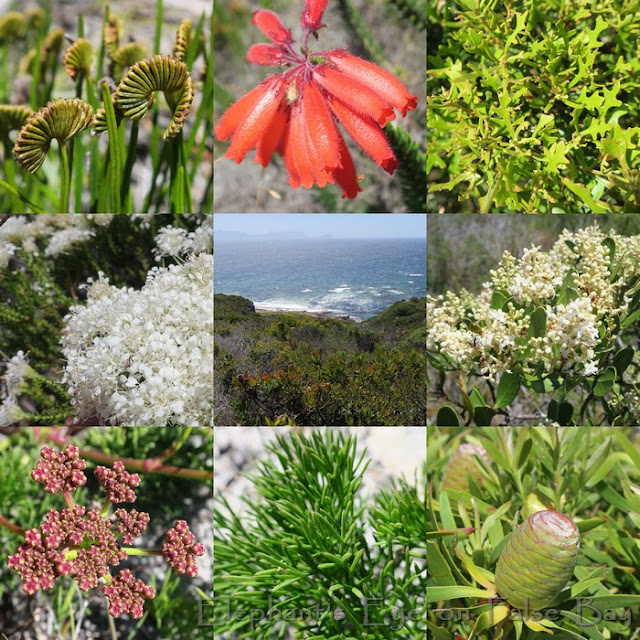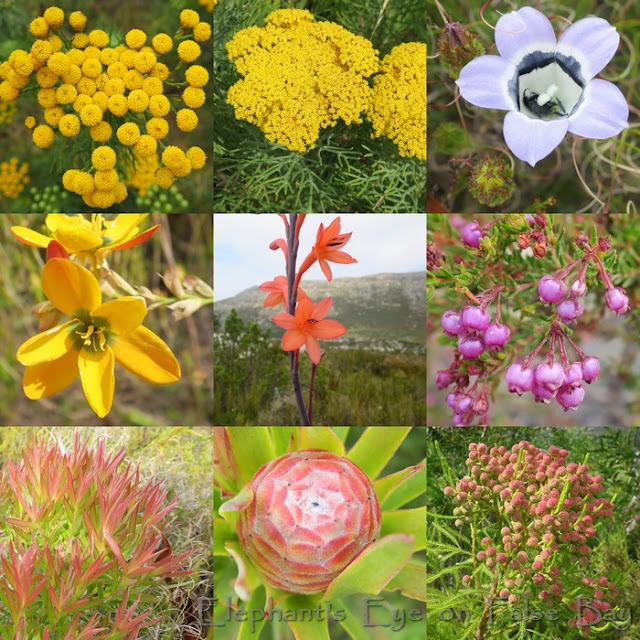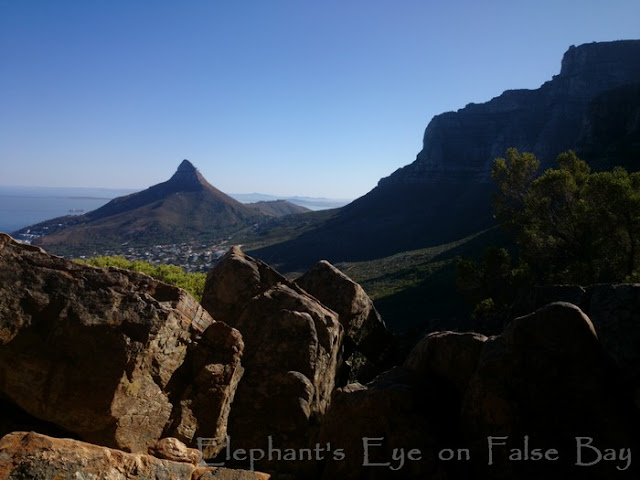Summer hikes in the mountains around Cape Town
by Diana Studer
- gardening for biodiversity
in Cape Town, South Africa
Hiking among
wildflowers
Looking back to before. To our summer hikes. Wide open
spaces. We have the blue sky and sunshine today too.
Our Fynbos Rambles take a break during mid-summer. We began
December at Kanonkop in Cape Point (in Table Mountain National Park) Daisies defy with endless variations. Along
the stream tall shrubs with masses of small yellow flowers Senecio halimifolius. So spectacular in flower Syncarpha gnaphaloides buds
and flowers,
then going to seed in full glory! Strawflowers from a tiny Helichrysum pandurifolium, to a stately Edmondia sesamoides with its leaves wrapped neatly around the stem.
One blush pink Gerbera crocea.
He hiked every week. Here looking
up at the cablecar from 'India' (add
to the long list - cablecar is closed till after)
Daisies again. Corymbium
africanum can have leaves like reeds, or flat blades like iris. Both the
same species. And despite looks can deceive, in the daisy family!
An oystercatcher egg. The nest a simple scrape in the sand. So
vulnerable on public beaches, but safer in Cape Point reserve. Where
Buffel has chosen to moult in peace away from the 'crowds' this year.
I was enchanted by Schizaea
pectinata the toothbrush fern! Furry red Erica cerinthoides. Morella
quercifolia leathery oak leaves (waxberry is in Fagales with oak and beech!)
A haze of fine white buchu flowers with delicious anise scented leaves Agathosma ciliaris. Blown off our feet,
we sat ourselves in the shelter of the bushes for tea. Olea capensis covered in white flowers. Carrot and parsley family Notobubon ferulaceum. Silver felted
female cone of Leucadendron coniferum.
Himself can sleep anywhere, even on the rocks tumbled down
Agatha's Gully. Which attracts photo ops for his hiking companions.
Two blue pea flowers Psoralea
and Otholobium bracteolatum. Unusual coral
sand Pelargonium psammophilum. Four
winged fruit make this shimmering succculent Tetragonia fruticosus. Lampranthus
bicolor has large yellow flowers emerging from bright orange buds. Tiny
heads of creamy flowers Phylica ericoides. Azure Aristea capitata. Mauvy pink Chironia linoides. Selago luxurians (since the flowers are densely packed - I am, underwhelmed)
His Pride of Table Mountain. Disa uniflora. On wet cliffs in Myburgh Ravine. Beyond my enthusiasm
for extreme fitness.
Our last short Fynbos Ramble in Silvermine. Yellow buttons Athanasia crithmifolia or unfurled
umbrellas Hymenolepis crithmifolia,
both with 'leaves like samphire'. Roella
ciliata large flowers with dramatic stripes (and a monkey beetle waving his
legs). Yellow flowers with a green heart in orange buds Ixia dubia. Salmon Watsonia
coccinea. Little cherries Erica
multumbellifera. Leucadendron
xanthoconus silvery russet new leaves, and a russet and silver female cone.
Brunia abrotanoides in pink and cream
balls.
Dedicated to the Locked Down. UPDATE from midnight today Thursday 26 March we will be on lockdown for 21 days.
The view from Woody Ravine back to Camps Bay (where Lion's Head was recently circled by another fire - defeated by our firefighters and buckets on helicopters)
The view from Woody Ravine back to Camps Bay (where Lion's Head was recently circled by another fire - defeated by our firefighters and buckets on helicopters)
I hike
with U3A (listed as False Bay)
I invite you to join us at Elephant's Eye on False Bay.
Please subscribe as you prefer
via Feedly,
or Bloglovin,
or Facebook
Teal blue text is my links.
To read comments if you are in email or a Reader,
first click
thru to the blog)
Thanks for comments that add value. Your comment will not
appear until I've read it. No Google account? Use Anonymous, then please
include a link to your own blog. I welcome comments on posts from the last 2
months.











Thank you for taking us with you on these hikes, it is wonderful to see what flowers you discover and the oyster catcher egg. How does your husband manage to sleep so easily ! Hope you both are staying safe and healthy. Sarah x
ReplyDeleteAs always, your plant pics manage to enchant me, Diana. I was particularly enamored with the toothbrush fern in this post. I hope you and himself are doing well in this most unusual of times. Best wishes!
ReplyDeleteLucky person to be able to sleep anywhere! I enjoyed all your photos and your description of your adventures. What a beautiful part of the world!
ReplyDeleteWhat a wonderful post dear Diana! Your pictures are eyecandies and heart warming. We all here in Austria and more then less the rest of Europe have to stay at home - so hiking with you was a pleasure.
ReplyDeleteHappy days and all my best. Take care
Elisabeth
Ditto to what everyone else said, and they said it better than I can. Enchanting!
ReplyDeleteFabulous flowers and what a variety all the same area and time of the year. Thank you for sharing this with us. Buttercups, dandelions, and a few others with lots of lush green grass, almost not worth photographing except for clumps of primroses and violets of course.
ReplyDeleteIt is hard to believe that Corymbium Africanum is in the daisy family. I am reminded of some flower I encountered last year (I no longer remember what or where) that was a composite, but had mostly ray flowers with few or no disk flowers.
ReplyDeleteI'm glad to know your hikes were winding down for the season anyway when they had to be stopped because of the pandemic.
We did catch a last cautious few in March, which will be my next post.
Delete